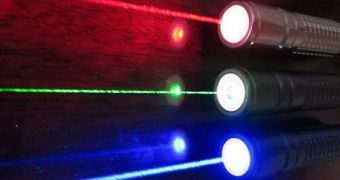Did you know that lasers can switch each other off, producing a blackout of sorts? That's OK, neither did anyone else until experts from Yale University, Princeton University, ETH Zürich and the Vienna University of Technology discovered that this laser-effect is actually real.
Unlike conventional light bulbs, whose lighting power is compounded when both shine together, lasers can display an opposite effect. Researchers discovered that turning on one laser, and then gradually bringing the other online as well can lead to complex interactions between the photon beams.
At one point, these interactions lead to the creation of a total laser blackout. The new discovery could have significant implications and applications for the fields of electronics and photonics, as well as for other areas of physics.
Details of the new study, and how the light interactions cause the blackouts, appear in the latest issue of the esteemed scientific journal Physical Review Letters, PhysOrg reports.

 14 DAY TRIAL //
14 DAY TRIAL //